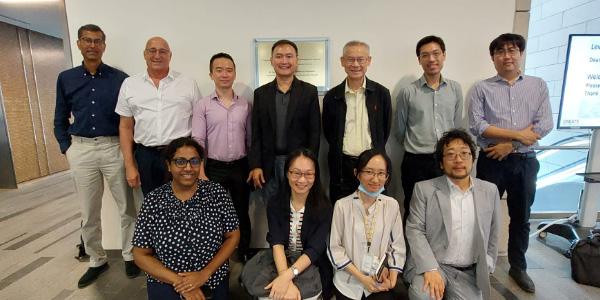News
IMCB reseacher awarded the National Research Foundation Competitive Research Programme (CRP) funding

The ‘SPECTRA’ team. Standing (left to right): Shyam Prabhakar (Team PI, GIS),
Nicholas RJ Gascoigne (Team PI, NUS), Chen Ching Kit (Team PI, NUHS), Jonathan
Yuin-Han Loh (Lead PI, IMCB), Andy Hor (Deputy Chief Executive (Research),
A*STAR), Leslie Beh (Collaborator, IMCB), Ng Lai Guan (Collaborator, Shanghai Jiao
Tong University). Front row (left to right): Uma Sangumathi Kamaraj (Principal Scientist
working for the project, IMCB), Chen Jinmiao (Collaborator, SIgN), Chen Ying (Principal
Scientist working for the project, IMCB), Li Qi-Jing (Team PI, IMCB & SIgN)
The National Research Foundation Competitive Research Programme (CRP) funding scheme seeks to foster the formation of multi-disciplinary teams to conduct cutting-edge research projects that are of relevance to Singapore and the society. The CRP funds useinspired basic research projects that are selected through a merit review process based on scientific excellence. The theme of the proposed research project must be motivated by an important need or problem to be solved. For the CRP29 grant call, five projects were recommended for funding out of a total of 36 submissions across the Singapore ecosystem. The Institute of Molecular and Cell Biology (IMCB) is proud to announce that one of the five recipients of this prestigious grant is our Deputy Executive Director (Research & Development), Jonathan Yuin-Han LOH along with team members from GIS, SIgN, NUS, NUHS and Shanghai Jiao Tong University.
Jon’s CRP29 project entitled “Spatial Multiome Cartography in Human Thymus to Guide NextGen Cell-based Therapies (SPECTRA)” is a collaborative effort between the Institute of Molecular and Cell Biology (IMCB), Genome Institute of Singapore (GIS), Singapore Immunology Network (SIgN), National University of Singapore (NUS), National University Health System (NUHS) and Shanghai Jiao Tong University.
A summary of the background and aims of the project is given below:
Thymus is the major site for T-cell development. Hematopoietic progenitors migrate from the bone marrow into the thymus, where massive engagements between migrating thymocytes and spatially ordered stromal cells, mainly thymic epithelial components occur to promote T-cell differentiation and maturation. During ageing, thymus shrinks in size, with the key epithelial components being gradually replaced by adipocytes. The reduced output from thymus could contribute to declining immunity in ageing populations. However, the mechanistic details governing both the development and ageing processes of thymus remain unclear. Therefore, this project firstly aims to deploy high-resolution single-cell spatial technology to decipher the molecular information governing the process of normal thymus development and ageing.
In addition, the thymus plays an integral role in the prevention of T-cell-mediated autoimmunity, by developing self-tolerance. Autoimmune diseases such as Myasthenia gravis (MG) is prevalent in patients with thymic epithelial cancer (thymoma). Hence, this project also aims to profile pathologic thymuses associated with MG, thymoma and other autoimmune disorders, to understand the mechanistic insights behind thymic diseases. We also endeavour to develop new technological platforms combining multiple modalities for a more integrative approach to profile those changes in thymus.
By doing so, we would have a more comprehensive understanding of both thymic ageing as well as the underlying mechanisms behind autoimmune conditions. Further improvements are possible for autologous cell treatment based on the findings from such studies, which could benefit patients who are suffering from either old age or autoimmune diseases.
A*STAR celebrates International Women's Day

From groundbreaking discoveries to cutting-edge research, our researchers are empowering the next generation of female science, technology, engineering and mathematics (STEM) leaders.
Get inspired by our #WomeninSTEM
.png?sfvrsn=c3edc68e_6)